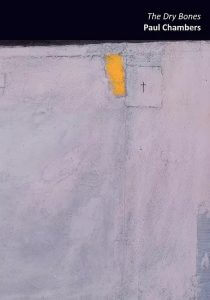Quiet Magnificence: Paul Chambers’ Openings to Higher Consciousness, in a Limited Edition
The Dry Bones by Paul Chambers
Review by Wally Swist
The Dry Bones is Paul Chambers’ third book of haiku poetry, and it is published in a limited edition of only forty numbered and signed copies by The Red Ceilings Press (53 High Street, New Mills, Derbyshire SK22 4BR Wales). What is made apparent in this aesthetically pleasing flat-spined paperback of new haiku by this Welsh haiku master, with its mesmerizing cover image, reminiscent of the paintings of Paul Klee, entitled “Chapel, Land and Sea,” rendered by Adam David Taylor, is both its startling clarity and expansive largesse in its adept imagery.
However, stylistically, the collection is distinctively marked with asceticism. Although the collection includes a modest eighty-six haiku thoughtfully spaced amid fifty-six unnumbered pages, these haiku demand that the reader linger with each poem due to their surprisingly lasting resonance. Also, unlike most haiku collections which arrange the work by seasonal themes, The Dry Bones is unique in its distinction of single-page separations alerting the reader that there is a pause between groupings, which are more nuanced than any seasonal grouping.
The groupings are actually more actively psychologically nuanced, if not spiritually so. However, there is still a sense of season, since it is more unconsciously revealed, yet it is still deeply presented, so much so that the term hosomi, or lightness, can be applied here with these haiku. There is a kind of lightness in the layering of each haiku poem and then there is yet another connection in the juxtaposition of each haiku with each other. Additionally, there is a distinct sense of initially reading Shiki or Basho in English translation than reading English-language haiku—that resonates as English-language poetry, which not all contemporary haiku written in English actually do.
What Paul Chambers accomplishes is capturing the lightning flash of the moment, as in the tensile imagery of “pylon hum/ the twitch of fibres/ in the horse’s shoulder,” or the cinematically etched images of “night bus . . ./ a handprint fills/ with moonlight.” This is indicative of what Robert Spiess, former longtime editor of Modern Haiku, termed “felt-depth,” which appears in striking abundance in Paul Chambers’ work.
But also there is a nascent and active spirituality present within these haiku, deserving of a nod toward Thomas Merton, due to haiku such as “lichen/ in a stone angel’s palm/ advancing rain,” which connects us to what is sacred in what I term “finding the numinous in the commonplace.” These haiku are not just haiku, they are poems that exhibit openings to higher consciousness, as in “convalescence . . ./ autumn revealing/ the river” or “pooling/ in a lemon rind/ evening rain.”
The haiku of Paul Chambers, founding editor of The Wales Haiku Journal, is both a haiku of self-awareness but is also a poetry of cosmic awareness, exemplifying one’s own mortality as well as one’s own sense of eternity in the present moment, when he writes: “drizzling rain/ my reflection/ in the hearse.” However, Paul Chambers can also be adequately described as a modern-day Issa too, when his vision so exquisitely portrays the suchness in seeing things just as they are, and releasing his readers on a journey of quiet magnificence: “sky clearing . . ./ a wren wipes its bill/ on a fence nail.”

The Dry Bones
Paul Chambers
The Red Ceilings Press
About the Author

Media Credit: Matt Lin
Wally Swist has published over forty books and chapbooks of poetry and prose, including Huang Po and the Dimensions of Love (Southern Illinois University Press, 2012), selected by Yusef Komunyakaa as co-winner in the 2011 Crab Orchard Series Open Poetry Contest, and Daodejing: A New Interpretation (Lamar University Press, 2015).
His translations have been and/or will be published in Chiron Review, Ezra: An Online Journal of Translation, The RavensPerch: Adding Breadth to Words, Solace: A Magazine of Diverse Voices, Transference: A Literary Journal Featuring the Art & Process of Translation, (Western Michigan Department of Languages), and Woven Tale Press.
Recent books of poetry include A Bird Who Seems to Know Me: Poems Regarding Birds & Nature (Ex Ophidia Press, 2019), the winner of the 2018 Ex Ophidia Press Poetry Prize, The Bees of the Invisible (2019), Evanescence: Selected Poems (2020), and Awakening & Visitation (2020), with Shanti Arts. Forthcoming books include A Writer’s Statements on Beauty: New & Selected Essays & Reviews, Taking Residence, and a translation of Giuseppe Ungaretti’s L’Allegria/Cheerfulness, also with Shanti Arts.
He is also the author of Singing for Nothing: Selected Nonfiction as Literary Memoir (Operating System, 2018).
